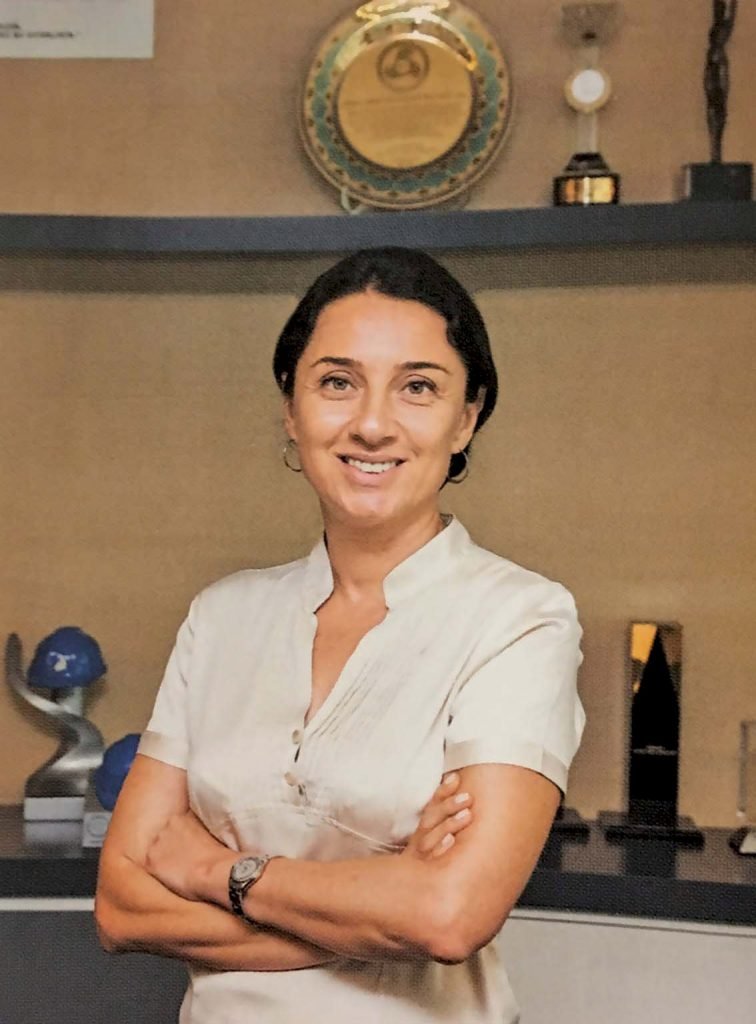Nevra ÖZATAY
General Manager
Çimsa
The cement sector has become an energy-intensive sector in terms of sustainability, especially in recent years as the sensitivity to the environment has increased and the work in this area has gained momentum.
Cement companies have a lot of responsibility for contributing to environmental sustainability. Research and development activities are very important in this area in order to improve the quality and functionality with the development of building materials. Research and development centers of companies in the sector are constantly looking for innovative and sustainable products in order to make environmentally friendly cement and cement based products. The use of alternative fuels contributes to the reduction of environmental impacts from wastes to a minimum and to the reduction of CO2 emissions, while supporting other sectors’ waste management processes.
The Turkish cement sector, which is among the first in Europe and the top 5 cement producers in the world, aims to contribute to sustainability by considering economic, social and environmental conditions and using technological opportunities. The cement sector, which contributes significantly to the country’s economy through employment opportunities, domestic revenues and export revenues, meets the primary fuel and raw material needs with alternative fuels and alternative raw materials meeting the acceptance criteria. While the use of alternative fuels in the sector in 2008 was 88 thousand tons; it reached 587 thousand tons in 2015 with an increase of 567%. Nevertheless, Turkey has not yet achieved the desired level of energy derived from alternative fuels in the cement sector. In Europe, the energy yield from alternative fuels is 30%; it is 3.5% in Turkey. Çimsa acts with the goal of becoming a leading cement and building materials company, creating value for the sustainable future. We believe that sustainable economic development cannot be created without conserving environmental resources in an environment where resources are becoming more and more diminishing and expensive. In our road map to carry our company to the future we have; efficient utilization of resources, recovery of wastes as energy and raw materials, investment in renewable energy sources as the main topics.
Our Company has invested 11 million Turkish Liras in Sustainability, Environment, Occupational Health and Safety issues in 2016. As Çimsa, we contribute to the Turkish economy with the direct added value we create for the country’s economy, as well as the energy efficiency policy we pursue and the activities we carry out through generating energy from alternative fuels. Since we are involved in an energy and raw material-intensive industry, substituting fossil fuels and natural raw materials with alternatives is at the top of our priorities. In recognition of the high cost of energy as well as the high contribution it makes to emissions, energy consumption points are regularly monitored throughout the manufacturing processes of all our plants and these processes are optimized.
With an awareness of our responsibility for the public and the environment, solutions are firstly established for the disposal of industrial wastes in the regions where Çimsa cement factories are located.
It is planned to negotiate with some Metropolitan Municipalities, where our plants are located, in the Mechanical and Biological Pre-Treatment Facilities, which can be installed on the municipal solid waste zones, as practiced in many European countries, for the burning of domestic RDF (Refused Derived Fuels) to be produced from municipal solid waste.
Çimsa Eskişehir Plant leads the cement sector with its alternative fuel usage rate. In 2016, in the 2nd Rotating Furnace of the Plant, which is 18.2 times the volume of a football field, 58.503 tons of alternative fuel was used together and 33% of the thermal energy was covered from these alternative fuels. In the same year, the secondary fuel use average of the Turkish cement sector was 3.7%; Çimsa has strengthened its leading position in the sector.
The total amount of energy used in our company’s cement operations is recorded as 21,626 TJ by 2016; 2.302 TJ of this consumption was electric energy; The 983 TJ part was achieved with the energy obtained from alternative fuels.
With the awareness that the basic principle leading to the Turkish cement sector is environmental, economic and socially sustainability, Çimsa acts in the awareness of its responsibilities. We are creating value for a sustainable future, especially through a proactive approach to environmental issues.


